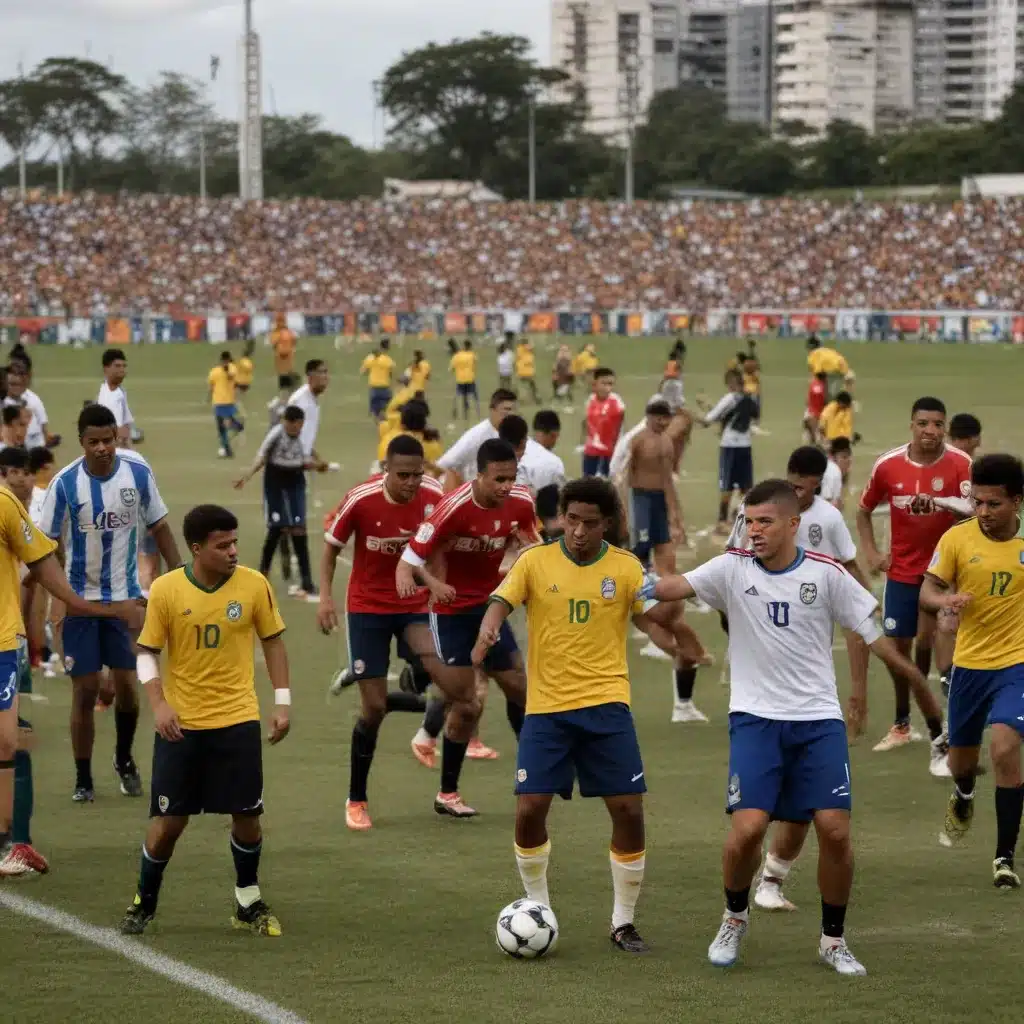
Traditional Football Formats
The heartbeat of Brazilian football is undoubtedly the Campeonato Brasileiro Série A, the top-flight national league that has captivated fans since its inception in 1959. Clubs like Flamengo, Corinthians, and São Paulo have etched their names in history, producing legendary players and captivating rivalries. The Campeonato Brasileiro Série B, the second division, provides a pathway for ambitious clubs to reach the pinnacle, while the regional Campeonato Estadual competitions showcase the depth of talent across Brazil’s diverse states.
Alternative Football Formats
But the Brazilian football landscape extends far beyond these traditional formats. Over the years, a vibrant ecosystem of alternative football formats has emerged, each with its own unique charm and cultural significance.
Futebol de Areia (Beach Football)
Futebol de Areia, or beach football, has long been a beloved pastime along Brazil’s picturesque coastlines. Played on the soft, sun-kissed sands, this fast-paced, technical version of the game celebrates the nation’s beach culture and attracts both professional and amateur players. Tournaments like the Mundialito de Futebol de Areia showcase the skill and flair of beach football, with players exhibiting their dazzling ball control and acrobatic finishing.
Futsal
The indoor variant of football, Futsal, has become a cornerstone of Brazilian football development. Thriving in urban environments, futsal emphasizes close control, quick decision-making, and tactical awareness – qualities that have produced some of the world’s most legendary footballers. The Campeonato Brasileiro de Futsal and the Taça Brasil de Futsal are prestigious national competitions that have unearthed a conveyor belt of talent, from the iconic Pelé to the modern-day maestro, Neymar.
Footvolley
Seamlessly blending football and volleyball, Footvolley has emerged as a unique and captivating alternative format. Played on beaches with a net dividing the court, the sport requires a delicate touch, aerial prowess, and impeccable timing. Footvolley tournaments, such as the Campeonato Brasileiro de Footvolley, have gained widespread popularity, showcasing the athleticism and creativity of the country’s football-loving beachgoers.
Emergence of Alternative Formats
Historical Roots
The proliferation of alternative football formats in Brazil can be traced back to the country’s rich folk football traditions. Before the codification of the modern game, various forms of recreational football were played across the nation, often adapting to local environments and customs. As the sport evolved, these grassroots variations found new homes in urban settings, thriving in the vibrant communities that embraced them.
Popularization
The rise of alternative formats has been driven by their ability to engage local communities. Beach football, futsal, and footvolley have become integral parts of neighborhood culture, fostering a sense of identity and camaraderie. Over time, these formats have also undergone a process of commercialization and professionalization, attracting sponsors, media attention, and elite-level talent, further cementing their place in the Brazilian sports landscape.
Sociocultural Significance
Community Identity and Cohesion
The alternative football formats in Brazil have become more than just sports – they are cultural expressions that embody the spirit and resilience of local communities. Whether it’s the sun-drenched beaches of Rio de Janeiro or the bustling urban centers of São Paulo, these formats have become a unifying force, bringing people together through a shared passion for the game.
Accessibility and Inclusivity
The accessibility and inclusivity of alternative formats have also played a crucial role in their popularity. Unlike the large stadiums and professional infrastructure required for the traditional game, these formats can thrive in smaller, more improvised settings, making them accessible to a wider range of participants. This has fostered greater grassroots participation, particularly among youth, who find in these formats a more inclusive and welcoming entry point into the world of Brazilian football.
Cultural Diffusion
The influence of alternative formats has transcended the boundaries of Brazil, becoming a source of cultural diffusion and inspiration for football enthusiasts around the world. The acrobatic displays and creative flair of Brazilian beach football and futsal have captivated global audiences, while the unique fusion of football and volleyball in footvolley has been embraced by beachgoers from Ipanema to Copacabana.
Challenges and Opportunities
Infrastructure and Facilities
Despite their widespread popularity, the alternative football formats in Brazil face infrastructure and facility challenges. The need for specialized courts, pitches, and equipment can sometimes limit the accessibility of these formats, particularly in less affluent communities. Addressing these infrastructure gaps and ensuring equitable access to these formats remains an ongoing challenge.
Governance and Regulation
The governance and regulation of alternative formats also present complexities. As these formats have evolved, establishing clear oversight, standardized rules, and effective coordination between various governing bodies has been crucial. Navigating these administrative hurdles while preserving the spontaneous and community-driven nature of these formats remains a delicate balance.
Talent Development Pathways
For the alternative formats to truly thrive, talent development pathways must be strengthened. Ensuring that promising players in beach football, futsal, and footvolley have opportunities to transition into professional careers and representation at the highest levels remains an area of focus. Bridging the gap between grassroots participation and elite-level competition is essential for unlocking the full potential of these alternative formats.
The rise of alternative football formats in Brazil has undoubtedly enriched the nation’s vibrant sports culture. From the sun-drenched beaches to the bustling urban centers, these formats have become more than just recreational activities – they are expressions of community identity, catalysts for inclusivity, and sources of global inspiration. As the traditional game continues to captivate audiences, the alternative formats stand as a testament to the enduring passion and creativity that define the Brazilian football experience. The future of these formats lies in their ability to address the challenges of infrastructure, governance, and talent development, while preserving the essence of the game that has made them so beloved. For those seeking to immerse themselves in the vibrant and diverse world of Brazilian football, the alternative formats offer a unique and thrilling perspective on the beautiful game.

